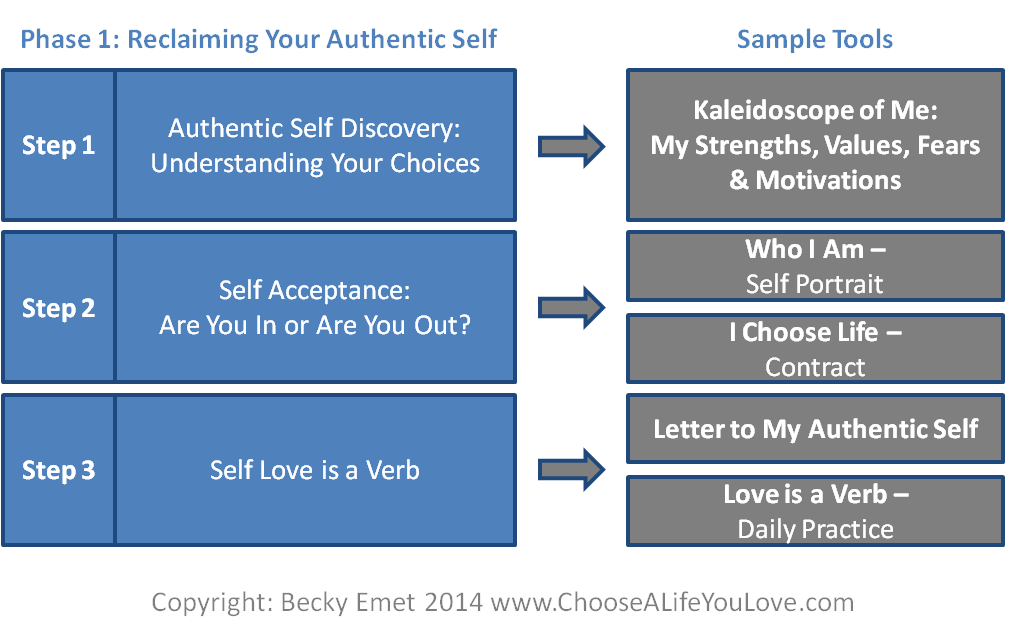She blogs on dysfunctional families on her website, www. This site is not intended to provide and does not constitute medical, legal, or other professional advice. The content on Tiny Buddha is designed to support, not replace, medical or psychiatric treatment.
BY Helene Lerner
Please seek professional care if you believe you may have a condition. Before using the site, please read our Privacy Policy and Terms of Use. Click to opt-out of Google Analytics tracking. Though I run this site, it is not mine. It's not about me.
DailyOM - In Her Power: Reclaiming Your Authentic Self by Helene Lerner
Your stories and your wisdom are just as meaningful as mine. Click here to read more. Reclaim Your Authentic Self: Here are the four steps: Find a private place, and let yourself express that feeling. Cry, punch sofa pillows, shake your fists, throw rocks into a pond—whatever helps. Tell yourself you can let go of that feeling. Help yourself remember that life can be good.
About Katherine Mayfield Katherine Mayfield is the award-winning author of a memoir about recovering from emotional abuse in her family, The Box of Daughter: See a typo, an inaccuracy, or something offensive? Please contact us so we can fix it! Did you enjoy this post? Please share the wisdom: Get wisdom in your inbox Join the Tiny Buddha list for daily or weekly blog posts, exclusive content, and promotions. Confused about love and and modern day dating.
Phase 1: Reclaiming Your Authentic Self
Disclaimer This site is not intended to provide and does not constitute medical, legal, or other professional advice. You are perfect - mind, body and spirit. You are exactly where you need to be. You have never made a bad decision, although the consequences of your decisions may not have always turned out as you might have anticipated or expected.
Sounds like a bunch of New Age nonsense, right? Well, not so much. The factors that contribute to our evolution are myriad - nature , nurture, socialization, acculturation, collective consciousness, collective unconscious , racial memory, soul memory, in utero experience, prenatal influence - the list is seemingly endless.
- The Anastasi System of Psychic Development | RECLAIMING YOUR AUTHENTIC SELF.
- Helping You Find True Fulfillment at Work & in Life.
- The Sixth Sense: Accelerating Organizational Learning with Scenarios.
- Destination:Unknown!.
What often shapes us most immediately and most profoundly, however, are the instructions that we are given as we develop. There really is no good explanation for why it is that we, as a culture, maintain a propensity to hear mostly the negative, as opposed to the positive, of those instructions, but that is the undeniable, and rather unfortunate, tendency.
- Saved for the Future: The work of the Art Fund (Cv/Visual Arts Research Book 112)?
- 42 Ways To Reclaim Your Authentic Self.
- Post Comment.
- THE ROAD TO VENGEANCE.
- {{content.sub_title}};
One supposes it has something to do with the Judeo-Christian ethic of "man-as-sinner" that is so deeply woven into the fabric of Western culture. Regardless, those negative instructions - "You're fat. That voice, however, - that Inner Critic - is predicated upon a lie; actually a whole series of lies. Those lies - or, more properly, our negative core beliefs as proscribed by them - establish for us many of the fixed fantasies that we hold about ourselves.
RECLAIMING YOUR AUTHENTIC SELF
And that voice, in turn, does its level best to inform - and mostly compromise -- our self-esteem. The lies issue from the perspective of those who themselves have lost contact with their own authenticity. They have their own set of lies to believe in. Remember the old adages, "When you point a finger, there are three pointing back at you.
Well, there you go.
Psychosocially, and from the standpoint of emotional intelligence , the bully is always the weakest one on the playground. On the other side of things, self-esteem is a wholly Western construct. Indeed, the notion of self-esteem - a notion that necessitates the inclusion of a dualistic "bad me" to balance out the "good me" - is quite foreign to Eastern thinkers. This is uniquely evidenced by the well known anecdote regarding a conference on Psychology and Buddhism some years ago where it was necessary to spend an entire day explaining the concept of self-esteem to a group of quite learned Eastern teachers and contemplatives, including the Dalai Lama.
It's not that they didn't understand the construct of self-esteem, but, more, it's that they didn't understand why such a construct was even necessary. The construct is necessary because we, at the sufferance of our own socialization, cling to this notion of "bad me"; a notion fostered by our fixation upon those formative negative instructions. There is really no way to avoid these negative instructions because they aren't about us - they are about the person who issues them. We can, however, manage the experience of those instructions, and the degree to which we allow them to influence us.
Customers who bought this item also bought
If we minimize and contain our experience of those negative instructions, recognizing them for what they are, then there is no real opportunity for us to generate the notion of "bad me". With no "bad me", there's no necessity for a "good me" -- there's just "me" This is a path back to the authentic self -- no conditions, no qualifications, no limitations.

In this way, we can work toward an unselfconscious iteration of ourselves, rather than version that is constantly second guessing and looking over our own shoulder.
